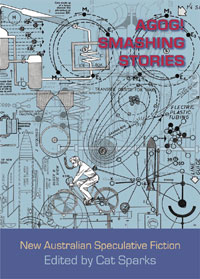The 2005 Snapshot
Australian Speculative Fiction: writers, editors, publishers
Deborah Biancotti
Deborah Biancotti
Interview by Ben Peek
 Deborah Biancotti's Ditmar Award nominated story 'Number 3 Raw Place' appears in Agog! Smashing Stories. She also has work appearing in Mitch? 4: Slow Dancing through Quick Sand.
Deborah Biancotti's Ditmar Award nominated story 'Number 3 Raw Place' appears in Agog! Smashing Stories. She also has work appearing in Mitch? 4: Slow Dancing through Quick Sand.
1) How would you describe a typical Deborah Biancotti story, and how do you think it's changed, or is changing?
A friend cruelly introduced me at a party recently as a 'writer', which always leads to the question 'what do you write?' I hate that question. I don't know how to answer it. I ended up saying 'fantasy' & then when the friend-of-friend looked at me pityingly, I carried on at great length reminding them that, well, Shakespeare used fantastical elements in his stuff, no one told him to write more mainstream, and what on earth did they imagine Gulliver's Travels to be, etc, etc, and so on. After name-dropping a few of the literary big wigs, I moved on to mention that Stephen King & J.K. Rowling were two of the richest writers in the world. (I did this in case their pity was directed not at my supposedly juvenile interest in bedtime stories, but had more to do with the impossibility of ever being a "successful" -- in the capitalist sense -- writer.)
I ended by telling them I write the kind of thing Mary Shelley wrote, except I am also able to make use of the entire literary canon to this point. I left them with the thought that 'the most interesting stuff is always at the fringes' and at that point they decided to change the subject. 'Bout time.
As to changing, my stuff's getting bigger. Just 'bigger'. More ambitious, more broad, more thoughtful, just more. IMHO.
2) How do comments about your work being obscure influence your decisions to push your personal boundaries?
Hmm, yeah, I have had that accusation a couple of times, though not as often as your question implies, Ben!
I'm like that bald guy in Lost -- "Don't tell me what I can't do." Comments on obscurity make me want to firm up my grasp on narrative. Maybe not for every story, though. Sometimes I'll still want to write my surreal, personal stuff as well. But if the understanding of story is a mountain, I intend to get to the top of it.
Apologies, is my answer maybe a little too surreal, there? In this instance, I am happy to answer more straightforwardly *grin*.
3) If the local scene is to grow, how is it to do this? And do you think this is a question that has been addressed in the last ten years?
Eh, I dunno. The scene (by which I take it you mean the number of active participants working in local artistic endeavours) seems pretty healthy to me. What I'm really interested in is expanding readership for what-we-currently-call 'genre'. It's purely a laziness thing. I'm tired of explaining myself at parties. ;)) I'm bored with the division between mainstream & genre. Look, if it was good enough for Mary Shelley, it's good enough for everyone, I say.
I like when I go into a bookstore (like, say, Better Read than Dead in Newtown) & the new release tables have all kinds of books lying cover to cover. China Mielville is right there between a book on the politics of Rwanda and something being described as 'a new Australian literary classic'.
'Has it been addressed in the last ten years', well, a lot of people say that the 'ghetto' of spec fic is what allows us to grow & to do challenging work without mainstream or financial interests shutting us down. I guess they have that whole mushroom theory -- things grow better in the dark, when nobody's watching. And hey, they could be entirely right.
Me, I think if we can get out of the ghetto we can run this town.
4) You're dead. It was a beautiful funeral, but the fact that you made us all donate to cover the costs has meant we're kinda pissed. But what do you care. You're in Heaven (assuming there is, blah blah) and you're in front of God. What do you say?
Sooooooo, funny bugger, hey?
5) Favourite swear word?
Cunt. I'm a traditionalist. Also a feminist. When I say cunt I mean it with respect.
©2006 Go to top

